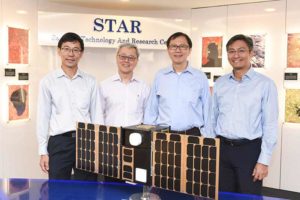
The National University of Singapore (NUS) and the Singaporean Defence Science Organisation’s (DSO) National Laboratory, with the support of the Singapore Economic Development Board (EDB), have announced the launch of their Satellite Technology and Research Centre (STAR).
STAR is being established to conduct research and develop small satellites, in particular distributed satellite systems that orbit Earth in formation, as well as develop the human and technical capacity in Singapore in satellite engineering and then develop commercial applications for these distributed systems.
STAR will be run by Professor Low Kay Soon of the Department of Electrical and Computer Engineering in the Faculty of Engineering at the National University of Singapore. STAR will be located in a 1400 square meter facility with clean rooms designed for satellite assembly and testing, and can house fifty engineers and researchers.
The facility will be located at the Kent Ridge campus of the National University of Singapore in the Singapore Wind Tunnel Facility.
The rationale behind STAR is the concept that small satellites – such as Nanosatellites and Cubesats – that orbit Earth in formation can provide a technological and commercial edge over larger satellites that take years to build and are very expensive.
With small satellites, STAR will seek to demonstrate that satellites can be mass produced and brought to market in much shorter timelines and at much reduced costs. Additionally, STAR will show that these satellites can bring about new commercial applications if they are orbited in formation since they can provide global coverage with minimal latency.
STAR will consist of three structured programmes: an education programme that involves multidisciplinary hands-on projects for students; a research programme “conducting cutting-edge research in mission design such as collaborative sensing, as well as subsystem and component development, using a precise navigation system with highly accurate clock, highly efficient power management system, advanced control of satellite propulsion systems, and other sophisticated technology;” and a satellite mission programme that, based on the research programme, will build a fleet of 20 kilogram satellites that will be launched no later than 2022. Among the applications being considered are environmental monitoring and maritime and aerospace security.
For several years now Singapore has been seeking to establish itself as a regional hub for commercial space activity and research, and STAR is the latest step in this initiative.
“For Singapore to gain a strong foothold in this knowledge-intensive sector, it is crucial to develop a vibrant space innovation ecosystem comprising a critical mass of home-grown talents, a thriving space industry, as well as a conducive research environment where scientists, engineers and industry partners jointly innovate and create new technologies to address satellite technology challenges,” said Professor Low, the STAR Director.
“NUS made its first foray into space in 2015 with the successful launch of two satellites, which demonstrated our strong capabilities in engineering and satellite technologies. The setting up of STAR will further sharpen these strengths and help to nurture a new generation of well-trained engineers and engineer-leaders who are ready to contribute to the space and aerospace industries,” said Professor Chua Kee Chaing, the Dean of NUS’ Faculty of Engineering.
“Satellite engineering is the pinnacle of engineering. As a national laboratory, DSO has developed strong capabilities in systems engineering, and we are excited to be able to contribute our expertise in this field to the vision of STAR – a leading centre for advanced distributed small satellite systems – to excite and nurture students to be future satellite engineers,” said Mr Cheong Chee Hoo, Chief Executive Officer of DSO.
“STAR aspires to be a leading centre for advanced distributed satellite systems. We will build and demonstrate the use of small satellites for various applications, such as detection and monitoring of airplanes and ships. Such capabilities will greatly enhance Singapore’s position as an aerospace and maritime hub. STAR will also work with industry players, both established companies and new start-ups, by providing our expertise and state-of-the-art satellite platform or subsystems. Such partnerships are critical in building a vibrant indigenous high-tech satellite industry,” Prof Low added.


